Related Research Articles

The Generalplan Ost, abbreviated GPO, was the Nazi German government's plan for the genocide and ethnic cleansing on a vast scale, and colonization of Central and Eastern Europe by Germans. It was to be undertaken in territories occupied by Germany during World War II. The plan was attempted during the war, resulting indirectly and directly in the deaths of millions by shootings, starvation, disease, extermination through labor, and genocide. However, its full implementation was not considered practicable during major military operations, and never materialized due to Germany's defeat.

The NIOD Institute for War, Holocaust and Genocide Studies is an organisation in the Netherlands which maintains archives and carries out historical studies into the Second World War, the Holocaust and other genocides around the world, past and present. The institute was founded as a merger of the Netherlands Institute for War Documentation and the Center for Holocaust and Genocide Studies (CHGS).

This is a selected bibliography and other resources for The Holocaust, including prominent primary sources, historical studies, notable survivor accounts and autobiographies, as well as other documentation and further hypotheses.

Ukrainian literature is literature written in the Ukrainian language.

During World War II, Reichskommissariat Ukraine was the civilian occupation regime of much of Nazi German-occupied Ukraine. It was governed by the Reich Ministry for the Occupied Eastern Territories headed by Alfred Rosenberg. Between September 1941 and August 1944, the Reichskommissariat was administered by Erich Koch as the Reichskommissar. The administration's tasks included the pacification of the region and the exploitation, for German benefit, of its resources and people. Adolf Hitler issued a Führer Decree defining the administration of the newly occupied Eastern territories on 17 July 1941.
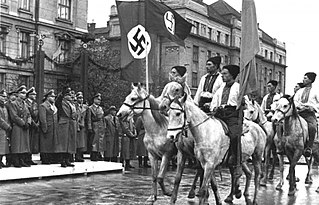
Ukrainian collaboration with Nazi Germany took place during the occupation of Poland and the Ukrainian SSR by Nazi Germany in World War II.
Kyiv Archive Museum of Transitional Period was a propaganda museum whose establishment was sanctioned by German occupants on March 26, 1942.
The Hunger Plan was a partially implemented plan developed by Nazi bureaucrats during World War II to seize food from the Soviet Union and give it to German soldiers and civilians. The plan entailed the genocide by starvation of millions of Soviet citizens following Operation Barbarossa, the 1941 invasion of the Soviet Union. The premise behind the Hunger Plan was that Germany was not self-sufficient in food supplies; to sustain the war and keep up domestic morale, it needed food from conquered lands at any cost. The plan created a famine as an act of policy, killing millions of people.

The Lviv pogroms were the consecutive pogroms and massacres of Jews in June and July 1941 in the city of Lwów in German-occupied Eastern Poland/Western Ukraine. The massacres were perpetrated by Ukrainian nationalists, German death squads (Einsatzgruppen), and urban population from 30 June to 2 July, and from 25 to 29 July, during the German invasion of the Soviet Union. Thousands of Jews were killed both in the pogroms and in the Einsatzgruppen killings.
Holodomor denial is the claim that the Holodomor, a large-scale, man-made famine in Soviet Ukraine from 1932–1933, did not occur, or the diminishment of its scale and significance, including the claim that it was not a genocide.
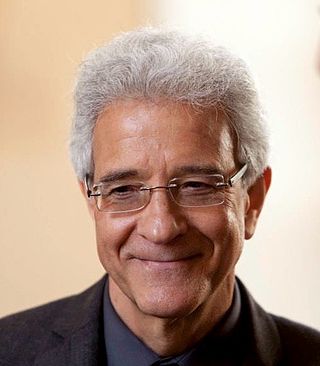
Omer Bartov is the John P. Birkelund Distinguished Professor of European History and Professor of History and Professor of German Studies at Brown University.

The Holocaust in Ukraine took place in the Reichskommissariat Ukraine, the General Government, the Crimean General Government and some areas which were located to the East of Reichskommissariat Ukraine, in the Transnistria Governorate and Northern Bukovina and Carpathian Ruthenia during World War II. The listed areas are currently parts of Ukraine. Between 1941 and 1944, more than a million Jews living in the Soviet Union, almost all from Ukraine and Belarus, were murdered by Nazi Germany's "Final Solution" extermination policies and with the help of local Ukrainian collaborators. Most of them were killed in Ukraine because most pre-WWII Soviet Jews lived in the Pale of Settlement, of which Ukraine was the largest part. The major massacres against Jews mainly occurred during the first phase of the occupation, although they continued until the return of the Red Army of the Soviet Union.
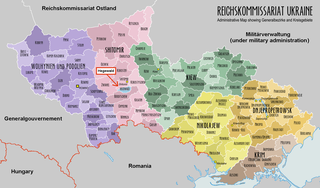
Hegewald was a short-lived German colony during World War II, situated near Zhytomyr in Reichskommissariat Ukraine. It was repopulated in late 1942 and early 1943 by Volksdeutsche settlers transferred from occupied territories of Poland, Croatia, Bessarabia, and the Soviet Union to an area earmarked for the projected Germanization of the Ukrainian lands. Plans were prepared months in advance by the SS, RKFDV and VoMi, but major problems with supplies occurred right from the region's initial establishment. Himmler's original plans to recruit settlers from Scandinavia and the Netherlands were unsuccessful.

Reichskommissariat Turkestan was a projected Reichskommissariat that Germany proposed to create in the Central Asian Republics of the Soviet Union in its military conflict with that country during World War II. Soviet historian Lev Bezymenski claimed that names Panturkestan, Großturkestan and Mohammed-Reich were also considered for the territory.
The Holocaust in the Soviet Union is the Nazi German persecution of Jews, Roma and homosexuals as part of the Holocaust in World War II. It may also refer to the Holocaust in the Baltic states, annexed by the Soviet Union before the start of Operation Barbarossa.
Poems about Babi Yar commemorate the massacres committed by the Nazi Einsatzgruppe during World War II at Babi Yar, in a ravine located within the present-day Ukrainian capital of Kyiv. In just one of these atrocities – taking place over September 29–30, 1941 – 33,771 Jewish men, women and children were killed in a single Einsatzgruppe operation.
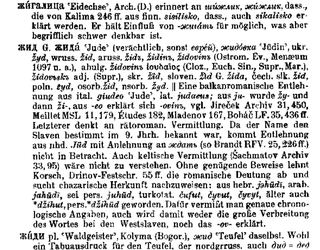
Zhyd and Zhydovka are terms for Jewish man and Jewish woman, respectively, in several Slavic languages. In some of those languages, they are considered pejorative.
Patricia Kennedy Grimsted is a historian focused on the dispossession and restitution of cultural materials during and after World War II. She is a leading authority on archives in the former Soviet Union and its successor states.
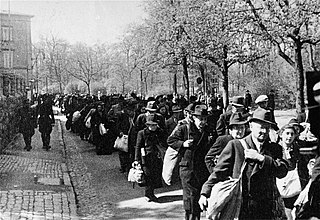
The question of how much Germans knew about the Holocaust while it was ongoing continues to be debated by historians. With regards to Nazi Germany, some historians argue that it was an open secret amongst the population, whilst others highlight a possibility that the German population were genuinely unaware of the Final Solution. Peter Longerich argues that the Holocaust was an "open secret" by early 1943, but some authors place it even earlier. However, after the war, many Germans claimed that they were ignorant of the crimes perpetrated by the Nazi regime, often using the stereotypical phrase "Davon haben wir nichts gewusst".

This is a select bibliography of post-World War II English-language books and journal articles about the history of Ukraine. Book entries have references to journal reviews about them when helpful and available. Additional bibliographies can be found in many of the book-length works listed below. See the Bibliography section for several additional book and chapter-length bibliographies from academic publishers and online bibliographies from historical associations and academic institutions.